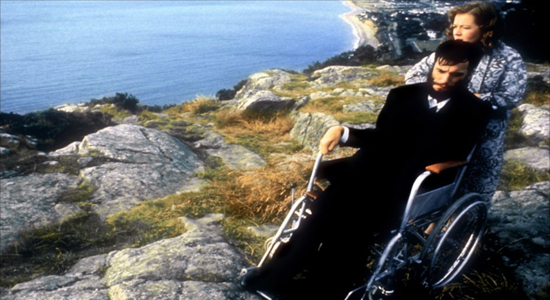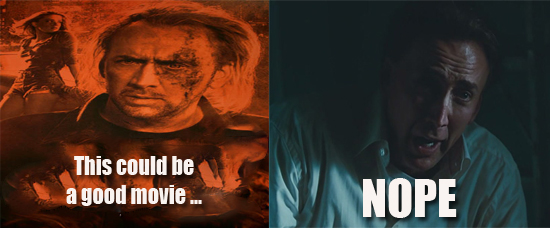A week ago someone asked me a question – Who decides who wins the Oscars? The wrong people, I replied.
But hey, I’m a cantankerous critic who often questions the taste of the Oscar voters and the credibility of movie awards. The Oscars don’t celebrate true artistic achievement, because every year quality cinematic gems are ignored in favor of bourgeois beanbags. Nor do the awards celebrate commercial success, since the Academy regularly turns its nose up at blockbusters, even good ones.
What the Academy actually champions is an odd mixture of commercial, indie, garishly overblown, and politically correct tripe. It’s all about studio lobbying and network ratings, and the Best Picture award is just meant to serve as Hollywood’s poster-child. In fact some of the Oscar voters have not had anything to do with the movie industry for more than 30 years. That is why we see old fashioned scum like War Horse get nominated over more radical and challenging stuff like Martha Marcy May Marlene.
I stopped watching the Oscars three years ago. Because the winners not only don’t let me reflect my feelings about them, but they also make me reach out for a baseball bat and storm towards the Kodak Theater. An ideal awards ceremony would fairly represent all sides of filmmakers’ struggle, but the Oscars are simply rating-hungry Teevee shows that pummel an urgent need of self-gratification upon your face. Year after year the Oscar voters continue to prove that they are unconnected to any known human behavior. Year after year they set out explicitly to demonstrate their belief that there is no relation between art, showmanship and intelligence. And judging by this year’s nominees I’m beginning to wonder if the Academy deliberately invites ridicule.
The unreasonably schmaltzy War Horse, one of the worst ever Spielberg movies garnered an unbelievable SIX nominations. This wouldn’t matter if the film were universally acclaimed or the least bit interesting. Instead it is mind-numbingly saccharine and melodramatic; the direction is banal and the acting (apart from Benedict Cumberbatch) is just embarrassing. I am not an expert on filmmaking but I would like to know why a horsey movie that requires you to consume half a dozen Hajmola tablets to digest its cheese scored over a true masterpiece like 50/50. The Joseph Gordon Levitt-Seth Rogen starrer achieves the impossible – it is a cancer comedy that combines humour with painful subjects, and not once do we feel the film’s tone shifting from one to the other. 50/50 is critically acclaimed, but the Academy didn’t bother to nominate even the cancer survivor writer Will Reiser, who lived to tell his story because of his belief that comedy can alleviate pain and make it easier to bear.
Extremely Loud & Incredibly Close, a movie that’s been disliked by every film lover I know and derided by the majority of the top Hollywood critics, received a Best Picture nomination. The Steven Daldry film is so self-important and manipulative in milking the 9/11 theme that it encourages us to pat ourselves on the back for tolerating it. But Richard Ayoyade’s exceptionally quirky bittersweet dramedy Submarine, and Steven Soderbergh’s magnificent Contagion, two films that bowled over both critics and audiences didn’t get even a whiff of the nominee ballots. Both those films also feature the best soundtracks of the year, but the Academy decided to have just two nominees for Best Original song, booting out Alex Turner’s glorious tracks for Submarine in the process. To add to the tomfoolery, neither of the two songs that were nominated will even be performed during the Oscars show.
The travesty doesn’t end there. Tilda Swinton, whose turn in We Need To Talk About Kevin tops even her own previous roles could not find a berth in the Best Actress slot. Among the year’s great performances you won’t find a greater one than Swinton as a traumatized mother. Anyone unable to find something extraordinary with her character should not only be not allowed to vote, but also not be allowed to watch films.
Laughably, Rooney Mara scored a Best Actress nom, despite playing a watered down version of the character played by Noomi Rapace three years ago in the original The Girl with the Dragon Tattoo. Fincher’s remake has a lot of nudity, and I can think of two reasons why Mara, and not Swinton delighted the Oscar voters.
Moreover, the jury seemed to be stoned or confused about which of the six Jessica Chastain films to vote for. She received a Best Supporting Actress nom for her one dimensional character in The Help instead of for Tree Of Life which required thrice as much conviction. And the less said about Elizabeth Olsen’s snub and Glenn Close’s inclusion, the better - if makeup and costumes add to an actor’s Oscar eligibility then Eddie Murphy should’ve won a statuette or two for Norbit.
If all that weren’t enough, Spielberg’s The Adventures of Tintin, a double Annie award winner and a favourite to win the Animation Oscar failed to score even a nom. I am all for endorsing films about cats, but Puss In Boots’ nomination made me gag. The fact that the Academy embraced a spinoff of the Shrek franchise and ignored a fresh film with a five-minute long single-take motorbike-boat-tank chase baffles me.
But the biggest, most shameless display of the Academy’s moral simplemindedness comes with their complete disregard for Steve McQueen’s Shame and its star Michael Fassbender. The Oscar voters didn't pick Fassbender’s character, a shallow self-gratifying wanker, because they probably are the same. Independent Cinema is an oxymoron, and it looks like poor McQueen will have to sculpt his whole career out of jumping from festival to festival, keeping his work alive with the grants, prizes, and prestige that come at international festival screenings. Instead of Fassbender, Gary Oldman was curiously nominated for his role in Tinker Tailor Soldier Spy - his character is neither a crowd pleaser like Brad Pitt in Moneyball nor even especially likable. The real reason behind Oldman’s nomination seems to be the Academy’s addiction to high grade cocaine or the need to flaunt their ‘generosity’ of including commercially unsuccessful cinema.
But ultimately it is futile to criticize these ludicrous awards. Everyone will be glued to their Teevees on Feb 26, because people regard the Oscars as an occasion to sit with family and friends, and admire the celebs, make fun of their daft acceptance speeches, or gaze at their gowns and cleavage.
I, on the other hand, shall be busy with my Joe Sacco graphic novels, not giving a fuck.








































